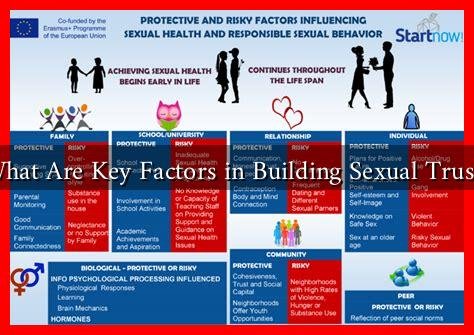-
Table of Contents
What Are Key Factors in Building Sexual Trust?
Sexual trust is a fundamental component of any intimate relationship. It fosters emotional connection, enhances sexual satisfaction, and promotes overall relationship stability. However, building this trust can be a complex process influenced by various factors. In this article, we will explore the key elements that contribute to establishing and maintaining sexual trust between partners.
Understanding Sexual Trust
Sexual trust refers to the confidence partners have in each other regarding their sexual relationship. It encompasses feelings of safety, respect, and openness, allowing individuals to express their desires and boundaries without fear of judgment or betrayal. According to a study published in the Journal of Sex Research, sexual trust is significantly correlated with relationship satisfaction and sexual satisfaction, highlighting its importance in intimate partnerships.
Key Factors in Building Sexual Trust
Several factors play a crucial role in developing sexual trust. Here are some of the most significant:
- Open Communication: Effective communication is the cornerstone of any healthy relationship. Partners should feel comfortable discussing their sexual needs, desires, and boundaries. Regularly checking in with each other about sexual experiences can help build trust.
- Emotional Intimacy: Emotional closeness enhances sexual trust. When partners share their feelings, fears, and vulnerabilities, they create a safe space for sexual exploration. This emotional bond can lead to a deeper understanding of each other’s needs.
- Consistency and Reliability: Trust is built over time through consistent actions. When partners demonstrate reliability in their words and actions, it reinforces the belief that they can be trusted in intimate situations.
- Respect for Boundaries: Every individual has personal boundaries regarding their sexual experiences. Respecting these boundaries is essential for building trust. Partners should discuss and agree on what is acceptable and what is not.
- Transparency: Being open about past sexual experiences, health status, and any potential risks is vital. Transparency fosters a sense of security and reduces anxiety about the unknown.
- Mutual Support: Supporting each other through challenges, whether they are emotional or physical, strengthens the bond between partners. This support can manifest in various ways, such as being understanding during difficult times or encouraging each other to seek help when needed.
Case Studies and Examples
To illustrate the importance of these factors, consider the following case studies:
- Case Study 1: A couple, Sarah and John, struggled with sexual intimacy due to past traumas. Through open communication and therapy, they learned to express their fears and desires. This process not only improved their emotional intimacy but also significantly enhanced their sexual trust.
- Case Study 2: Lisa and Mark faced issues related to infidelity. By establishing clear boundaries and maintaining transparency about their feelings and actions, they were able to rebuild their trust over time, leading to a more satisfying sexual relationship.
Statistics on Sexual Trust
Research indicates that sexual trust is a significant predictor of relationship satisfaction. A survey conducted by the American Association for Marriage and Family Therapy found that:
- 70% of respondents reported that open communication about sexual needs improved their relationship.
- 65% stated that emotional intimacy was crucial for feeling secure in their sexual relationships.
- Over 80% believed that respecting boundaries was essential for building trust.
Conclusion
Building sexual trust is a multifaceted process that requires effort, understanding, and commitment from both partners. By focusing on open communication, emotional intimacy, consistency, respect for boundaries, transparency, and mutual support, couples can create a strong foundation of trust that enhances their sexual relationship. As highlighted by various studies and case examples, investing in these key factors not only improves sexual satisfaction but also strengthens the overall bond between partners. For more insights on building trust in relationships, consider exploring resources from the American Association for Marriage and Family Therapy.

